 Petzlover
Petzlover German Spitz (Mittel) is originated from Germany but Scottish Deerhound is originated from United Kingdom. German Spitz (Mittel) may grow 43 cm / 16 inches shorter than Scottish Deerhound. German Spitz (Mittel) may weigh 39 kg / 85 pounds lesser than Scottish Deerhound. German Spitz (Mittel) may live 6 years more than Scottish Deerhound. German Spitz (Mittel) may have less litter size than Scottish Deerhound. German Spitz (Mittel) requires Moderate Maintenance. But Scottish Deerhound requires Low Maintenance
German Spitz (Mittel) is originated from Germany but Scottish Deerhound is originated from United Kingdom. German Spitz (Mittel) may grow 43 cm / 16 inches shorter than Scottish Deerhound. German Spitz (Mittel) may weigh 39 kg / 85 pounds lesser than Scottish Deerhound. German Spitz (Mittel) may live 6 years more than Scottish Deerhound. German Spitz (Mittel) may have less litter size than Scottish Deerhound. German Spitz (Mittel) requires Moderate Maintenance. But Scottish Deerhound requires Low Maintenance
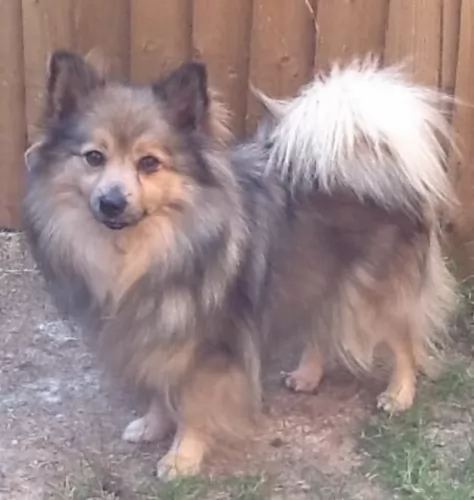 Originating in Germany, the German Spitz Mittel is an alert, vigilant dog and it is these qualities that made him sought after for working on farms.
Originating in Germany, the German Spitz Mittel is an alert, vigilant dog and it is these qualities that made him sought after for working on farms.
He is no new breed and is the 3rd largest of the five German Spitz varieties. It is believed that the German Spitz descended from the Northern sled and herding dogs which arrived with the Vikings into Europe. When you do research you see that the dogs are mentioned in German literature which dates way back to to 1450 already.
 The Scottish Deerhound is considered the Royal Dog of Scotland. It is a sighthound that is large and bred to hunt large Red Deer. They are similar in appearance to the Greyhound, but they are bigger and heavier. Closely related to the Irish Wolfhound, they were used in creating it. The Scottish Deerhound is an ancient breed that is now very rare. It can trace its lineage to the 16th and 17th centuries.
The Scottish Deerhound is considered the Royal Dog of Scotland. It is a sighthound that is large and bred to hunt large Red Deer. They are similar in appearance to the Greyhound, but they are bigger and heavier. Closely related to the Irish Wolfhound, they were used in creating it. The Scottish Deerhound is an ancient breed that is now very rare. It can trace its lineage to the 16th and 17th centuries.
The Deerhound was a favorite of hunting nobility and could not be kept by any person or household that did not have at least the rank of earl. Despite this history the Scottish Deerhound was not considered separate from the Highland Greyhound and other staghounds until the 19th century. They were bred to stalk or “course” the red deer and were used extensively for this purpose until the beginning of the 20th century. At that time there was a need for smaller, slower deer tracking dogs.
At the start of the 20th century, the land for deer hunting had grown smaller and so had the deer. Also, the invention of the rifle made the fast Deerhounds who could cover large tracks of ground in minutes, no longer a necessity for successful hunting. As the clan systems fell and the nobility rose, the Deerhounds became the dog for nobility and landowners. There were a few non-nobilities who also kept them and hunted with them. As they were less needed for hunting a few households kept them as show dogs.
In the United States and Canada, both the Scottish Deerhound and the Greyhound were used for hunting wolves and deer. In Australia, the Kangaroo Dog – a deerhound crossbreed, and Deerhounds were used to hunt wild boar, emu and kangaroos. The Deerhound is one of the oldest of the breeds that are Greyhound-like. The Deerhound is not as fast as the Greyhound if they are running on a smooth surface. Get them on a rough surface and the will out that Greyhound. They appear to be larger and rougher than they really are. This gives them an advantage over the lighter, smaller Greyhound.
The Deerhound was a contributor to development of the Irish Wolfhound toward the end of the 19th century.
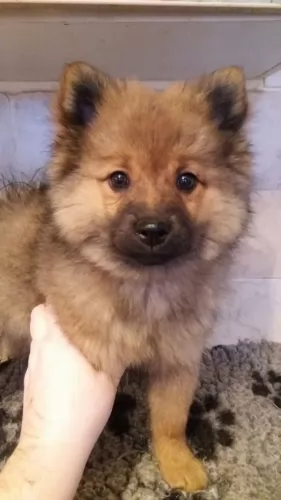 The German Spitz Mittel is similar in looks to the other sizes of German Spitz. The Mittel is a medium sized dog and stands between 30 and 38cm in height and weighs between 7 and 11kg. You’ll find him in solid colors such as tan, liver, white, fawn, black or a mix of these colors.
The German Spitz Mittel is similar in looks to the other sizes of German Spitz. The Mittel is a medium sized dog and stands between 30 and 38cm in height and weighs between 7 and 11kg. You’ll find him in solid colors such as tan, liver, white, fawn, black or a mix of these colors.
He has a soft woolly undercoat and a long outercoat with a mane-like ruff at the neck. He has a fairly long muzzle, dark eyes, sharp erect ears and a bushy tail which curls over his back.
Affectionate, faithful, and always happy by nature, the German Spitz Mittel is a family companion that wants to be part of everything his human family is up to. He makes a good watchdog. He is alert and has a distrust of strangers.
He gets on well with children in the home and he can also live in peace with other dogs. Because he is an intelligent dog, you won’t have much trouble with training- and socializing him, although he will require a firm, consistent owner and trainer.
Training and socialization are important as there are always some important commands such as sit, stay, come and lie down that you will want him to respond to immediately.
 The Scottish Deerhound looks a lot like the Greyhound, except it is heavily boned and larger in size. The Deerhound is also different in several other ways. Instead of the Greyhound, the Scottish Deerhound is more closely related to the Irish Wolfhound than the Deerhound. The Deerhound is a large, rough coated breed. It is a very tall breed; in fact, it is the tallest of all sighthounds.
The Scottish Deerhound looks a lot like the Greyhound, except it is heavily boned and larger in size. The Deerhound is also different in several other ways. Instead of the Greyhound, the Scottish Deerhound is more closely related to the Irish Wolfhound than the Deerhound. The Deerhound is a large, rough coated breed. It is a very tall breed; in fact, it is the tallest of all sighthounds.
The Deerhound has a long head with a flat skull and a muzzle that tapers at the end. They have dark eyes and a scissor bite with a tail that can be either curved or straight. The hair on their tails almost touches the ground. The rest of its coat is wiry and harsh with a beard, mustache and mane. The ears are soft and can be either held semi erect or folded against their head. Their coat is gray or grey-blue today but in the past, it might have been brindle, red fawn or yellow.
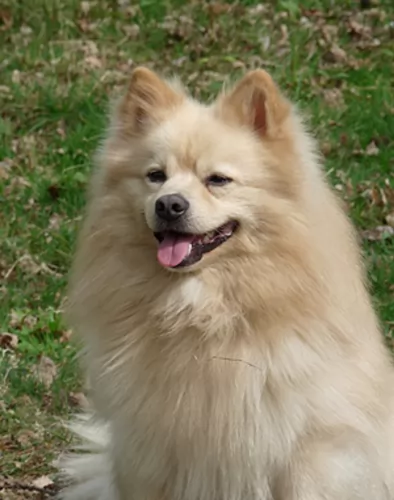 People who have owned a German Spitz Mittel are delighted with him, saying that he is such an easy-going, happy dog. He is social and thrives on the interaction he has with his human family.
People who have owned a German Spitz Mittel are delighted with him, saying that he is such an easy-going, happy dog. He is social and thrives on the interaction he has with his human family.
He won’t do well if you simply put him in your backyard and forget about him, using him merely as a watchdog.
The German Spitz Mittel dog is one dog that definitely lives up to the title of man’s best friend. He is social, happy, loving, loyal, playful, entertaining and smart too, and when you treat him the way he deserves, you’ve got the most awesome friend.
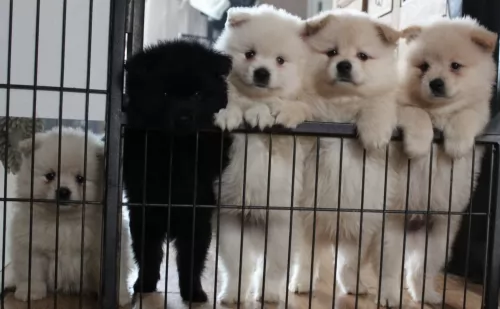 German Spitz dogs are healthy, and when you shower him with love and attention and good food, you can expect to have him around for up to 15 years of age.
German Spitz dogs are healthy, and when you shower him with love and attention and good food, you can expect to have him around for up to 15 years of age.
Of course, as with any other healthy dog breeds, there are always one or two common dog illnesses that your dog may get. These include hip dysplasia and eye diseases. If you notice symptoms that indicate possible joint issues with your pet, get him to the vet immediately.
Patellar Luxation for instance occurs when your dog’s kneecap is dislocated. It is more common in toy breeds like the German Spitz. It can be painful for your pet and lead to lameness. If your dog has problems with his hip, it can actually force the patella out of its groove, which is a secondary condition.
 The Scottish Deerhound does face some serious challenges on the health front. These include:
The Scottish Deerhound does face some serious challenges on the health front. These include:
• Cystinuria – recessive disorder that causes an inability for cystine to be filtered from the urine.
• Gastric Dilatation Volvulus – otherwise known as bloat and it can be life threatening if not treated quickly.
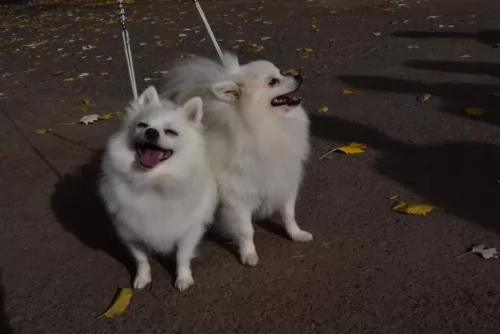 You can help reduce loose hairs with your German Spitz by brushing his thick coat twice a week. It’s a good time to also inspect your dog for ticks and fleas.
You can help reduce loose hairs with your German Spitz by brushing his thick coat twice a week. It’s a good time to also inspect your dog for ticks and fleas.
Your German Spitz Mittel isn’t the most active dog, but he will still need regular exercise. Going on a walk is good for both you and him. He is a mentally sharp dog too and these walks keep him both physically- and mentally fit. He also loves ball games.
Every dog deserves the best food, and if you feed your German Spitz Mittel with a commercially manufactured dog food, make sure its one of the top quality ones. You want to avoid foods packed with preservatives, colorants and fillers. You want dog foods with minerals and vitamins with high protein and ingredients such as Omega 3 and 6 to promote health skin.
There are also some dog foods which have ingredients in them such as polyphosphates. Ingredients like this keep your dog’s teeth clean.
Try and also give him some cooked rice, vegetables and chicken mixed into his kibble from time to time as well as raw meat. He should never be without fresh, cool water.
 1.Feeding the puppy – Feed a high quality large or x large puppy dogfood at least 3-4 times a day. Do not overfeed.
1.Feeding the puppy – Feed a high quality large or x large puppy dogfood at least 3-4 times a day. Do not overfeed.
2.Feeding the adult – Feed a high-quality adult large or x large dog food once or twice a day. Do not overfeed.
4. Games and Exercises – The Deerhound needs plenty of exercise in a safe place where they have plenty of room to run. A small yard or life on a leash are not enough for this energetic breed. Play fetch, course running, Like the Greyhound they will be couch potatoes if you let them but that will hurt their health. Lure Coursing or hare coursing are good. Coyote hunting. Find space where they can run for the joy of running. Never force them to run – like along a bicycle